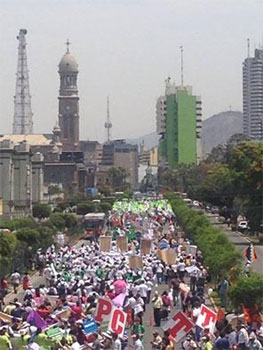With two days to go on the climate talks taking place in Lima, Peru, officials are frantically trying to put a draft treaty together and protesters are in the streets.
The same tired arguments haven’t gone away even with the US-China deal. Brazil, India and other developing countries want time to grow (and keep polluting) and want the historic polluters to take responsibility for most emissions reductions.
Officials are also clashing over whether emissions cuts should be mandatory and how much money rich countries should pay poor ones to help them mitigate and adapt to climate change.
Still, the word is there could be a treaty! A draft is circulating, which includes a target of zero carbon emissions by 2050!
The hurdle they won’t be able to overcome is achieving a binding single, global benchmark for world emissions reductions – that together, keep temperatures from exceeding 2°C (3.6°F).
Early next year, negotiators are looking for all countries to announce climate targets. This week they are hammering out what those targets should include: the target and benchmark years (ie, 50% cuts by 2040 below 1990 levels); whether emission cuts come from certain industries or are national; and whether they will be independently verified.
Australia is sabotaging a potential agreement by insisting country targets be mandatory – which they know full well will never get through the Republican US Congress or in China. Australian delegates want to enlarge the "Like-Minded Group", which opposes real action on climate change, including a price on carbon.
In the midst of yet another torrential typhoon, the Philippines reversed course, saying it will announce climate targets and urges other developing nations to follow their lead.
"If we’re going to get hit every year again and again, how can we call on developed countries to reduce their emissions, but not reduce our own?" asks Tony La Viña, a delegate from the country.
The Philippines left the "Like-Minded Group" which includes petro-states like Saudi Arabia, Iraq, Kuwait, Venezuela and Australia – and has been stalling action for years. Instead, it now leads the "Most Vulnerable Countries."
Fossil Fuel Companies Are There
Activists are furious that oil companies are there – including TransCanada – hosting panels and holding private meetings with numerous national delegations. As with past UN climate summits, they say it’s being hijacked by corporations and the interests of wealthy people and nations, preventing the urgent action that is needed.
They shut down a fossil fuel sponsored panel, "Why Divest from Fossil Fuels When a Future with Low Emission Fossil Energy Use is Already a Reality?" that featured speakers from the World Coal Association and Shell!
Today, the "People’s Climate March" winds through Lima.

Status of Negotiations
The good news is that for the first time, commitments from China, the US and EU are big enough to make a difference. Meeting their targets would keep global temperature rise between 2.9 to 3.1°C, according to Climate Action Tracker.
Clearly, they need to move higher and the rest of the world must join them, but it’s a start.
With 2014 expected to be the warmest year on record, global temperature rise has reached 0.8°C, and is on track for 4°C (7.2°F).
Negotiators seem to be giving up the 2°C goal and looking at 2.2-5.6°C (4-10°F) as a more achievable target.
"4°C would likely be catastrophic rather than simply dangerous. It would make life difficult, if not impossible, in much of the tropics, and would guarantee the melting of the Greenland ice sheet and some of the Antarctic ice sheet," Steven Sherwood told The Guardian. He authored a study on the implications of reaching four-degree warming as a professor at University of New South Wales, Australia.
More evidence of giving up is in this kind of statement, "We need to put adaptation on the same footing as mitigation," says Su Wei, China’s lead climate negotiator.
Watch the action at Democracy Now:
